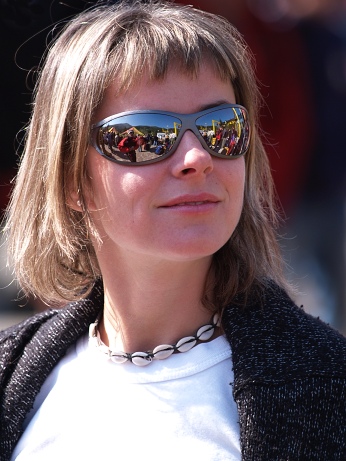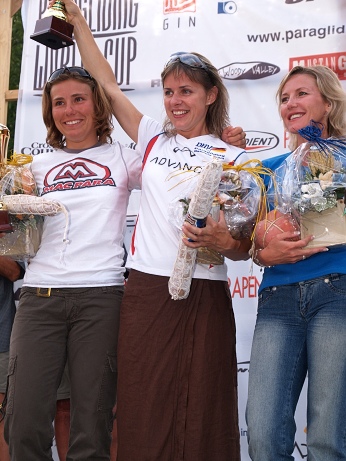 Rabin Chitrakar laments the decay and chaos of post-monarchy Nepal:
Rabin Chitrakar laments the decay and chaos of post-monarchy Nepal:
Everyone is playing their own trumpets and expects others to listen to none other but them.
We all have preferences. Some of us want change
NOW. Others want it the
RIGHT WAY. Yet others wish neither happened.
Whatever the choices, the bloodshed in the past decade has forced our leaders to work for peace. And a peace process is in place. Unfortunately, there are some roadblocks to a sustainable peace.
I am not a die-hard supporter of any party, or the king, for that matter. But I believe in a just society, in an inclusive society. Equality, at least in theory, is such an enchanting idea, but no society is equal. We create hierarchies of all sorts intentionally or unintentionally. Equality, whether it is emanating from a king's wishes or from the Maoists' decree, cannot replace fairness and justice, which is so scarce these days in Nepal. Everyone is playing their own trumpets and expects others to listen to none other but them.
After the Maoist insurgency that killed around 15,000 people, the country was in a great chaos. The parties were unable to solve the problem. The five years term of the Parliament was over. The then Prime Minister Sher Bahadur Deuba could not conduct general election on time. He recommended the king for dissolution of the house and prolongation of the general election for the second time by six months by applying article 127 of the constitution. His government was dissolved by the king on the charge of incompetence. The King made three consecutive governments under Lokendra Bahadur Chand, Surya Bahadur Thapa and again Sher Bahadur Deuba. Some parties, including United Marxist and Leninist (UML) took the appointment of Deuba as the Prime Minister again as a correction of the king’s earlier steps and hence joined the government.
However, Nepali Congress (NC) continued to demand the restoration of the House. Deuba's government again could not hold general election at the given time. On Feb. 1st, 2005, the king dismissed the existing coalition government of Deuba again on the same charge and formed a new cabinet under his own chairmanship asking for three years of time. Political parties did not support his action. All the parties joined hands with NC's unconditional demand. The king held municipal elections as the preparation for the general election. But most of the parties did not take part in the polls. So the king also could not bring relative peace, the unconditional demand of Nepalis. He could not resist the pressure of the parties. He restored the dissolved lower House in April 2006.
The parties took the proclamation as their victory over the king who was the chief of the national army. The lower house was restored from the provision of the constitution. But surprisingly, and immediately, the whole constitution was paralyzed. It has been abolished with the interim constitution declared on January 16, 2007. The proclamation has victimized the proclaimer himself. All the powers of the king have been snatched. He is in a state of abduction. Increasingly, it looks like the constitutional assembly is going to abolish the very institution of monarchy in Nepal.
The parties were successful in forcing the king to restore the house mainly because of the support of the Maoist party.
So what do we have now? We now have a Nepal divided into anti-royalists, liberal royalists and neutrals. The only difference is the former have the freedom to do what they please and the latter have been denied any voice. The peace process is so fragile that the Maoists continue their decree, and they continue to kidnap and abduct and extort people whenever they please. In remote districts people continue to pay taxes to both the Maoists and the government.
America may have declared its war on terror. But in Nepal the Maoists, in alliance with other political parties, have declared their war on Monarchy. All of a sudden, after April 2006, anything monarchical has become anathema in our national discourse. The object of hatred used to be Maoists. Now it is monarchy and monarchical elements. We have merely shifted the gears. We have not learned much from past experiences.
Another existential crisis
In the name of democracy, the parties have recruited and appointed MPs, without elections of any short. On the other hand, royalist parties and their representatives have been boycotted. There is no freedom for pro-monarchical constituencies. In December 2006, a mob disrupted a national convention of one of the pro-palace parties in Pokhara. It did not end there. A group of Maoists attacked the party members who were on their way to the Prime Minister's residence to submit a memorandum against that disruption. The Maoists’ intention has been to abolish monarchy no matter what. Can we, then, expect a free and fair constitutional election under such circumstance?
Talking about fairness, this whole problem started because of a general lack of it. The Maoists' began to demand more inclusiveness, paradoxically, with the start of democracy in 1990. The Maoist insurgency started, to my mind, because of huge corruption, injustice, misuse of power and power riddle in our governments. Before the start of the insurgency, the rebels had submitted a 42-point demand. Subsequent governments ignored their demands, and helped fuel the war. We lost peace.
There is no doubt that peace is terribly needed now. But, as a free-minded person, I see that the peace process does not look genuine. A few years ago, only the king and democratic alliance used to be taken as the two major political forces. Now every Nepali may have realized that it is merely because of the existential crisis of the Maoists that we now have a peace process. Had they been taken as one of the important political forces early on, possibly Nepal, the birthplace of the Buddha, would not have to suffer such a shameful and bloody war. Because of their destructively witty and bold decision, the Maoists have now compelled every one to take them as one of the important political forces.
Now the king has been removed from the list. As once Maoists were minimized, now the monarchy is minimized. Because of personalistic egos of political leaders and the king, our institutions are suffering. We may blame monarchy for backwardness, and monarchy as an institution may be a thing of the past for many countries, but there are still scores of advanced countries with monarchies. Take for example, England or Japan. I think Nepal's monarchy has been blamed unfairly. In fact, except for the Panchyat era, the country's monarchy has been abused by others. The Shah kings have been subjugated over the centuries by courtiers and bhardars. After the unification of the country by Prithvinarayan Shah, the true rulers of the kingdoms were the Thapa and the Pandey mukhtiyars. The rise of the army officer Bir Narsingh Kunwar (Junga Bahadur Rana, a maternal grandson of the famous Bhimsen Thapa) as a premier in 1846, and the 104-year Rana dictatorship left little room for the Shah kings to directly exercise their powers. The Pachayat era is an exception. Now monarchy of Nepal has again become an easy prey because it has become vulnerable.
King Gyanendra should not be turned into a scapegoat more than he deserves. Monarchy and a monarch are not always synonymous. True, an institution is different from an individual. To the fair discerning eyes it seemed that king Gyanandra tried to shift the quarrelsome democracy to a peaceful democracy. Constitutionally, he was merely acting like a president, as they do in other countries during times of crisis. In some states of India, there is presidential rule most of the time. Since the Lower House of Nepal appealed the king to apply article 127 of the constitution, the article of last resort and of conscience, and since the governments were unable to settle the Maoist crisis (instead, they were fighting one another) he tried to resolve the crisis in his own accord, though unsuccessfully. For hundreds of times (if not more) he told the national and international community that he is committed to democracy and constitutional monarchy and he asked only for three years' time. But we know what happened thereafter: The parties played revenge politics and did not listen to him. They boycotted elections (although the Terai region saw 70 percent participation in the municipal polls), and went to the streets. After the movement of April 2006, they went further and suspended monarchy itself.
Monarchy’s future
We all know we are not talking here about a monarchy that committed genocide or mass murders or anything like. The Rayamajhi Commission is not about such things, but does record atrocities against pro-democracy protestors and the killing of a score of demonstrators. Killing of even a single person is certainly unacceptable and it would have been far better had the king stepped down earlier. And, at the same time, we should not forget the much horrible atrocities committed by Maoists and government forces in the past decade. Moreover, even in last month's Terai protest, 31 people were killed by the government side. It may be tempting to find a master evil face in the king to explain the unexplainable in Nepal. But there are several such faces in Nepal and not just one.
We must not forget, particularly during these times of transition, that the institution of monarchy alone does not deserve all the blame for the Nepali ills. The political parties are also responsible to some extent for the mess as they created a background for the king's recent actions. The parties politicized every organization, including the academia. As an example, the executive heads of all the universities were forced to leave their offices following the new political developments in April 2006. All the posts still remain vacant. The government is not in a position to fill out the posts as they have a conflict in the division of the posts. Even for a promotion of staff of any office one should have political links. Cronyism is deeply entrenched in our bureaucracy. Influential party workers and governmental staff members are transferred to 'good offices' that are more lucrative, i.e. where corruption is possible. Corruption has become open.
What I see in the present efforts of the parties for abolishing the monarchy is that they are trying to hide their faults by blaming the king for all their misdeeds. The peace process has totally disregarded monarchy. What is the wisdom, for example, behind the criticisms against Girija Prasad Koirala for his saying that in a democracy everyone, including the King, must be given a space? We say we are for a non-violent change and for an inclusive democracy but we don’t even tolerate an institution that is the very foundation of our nationhood. We have become a society of bigots.
Many people in this country still believe in monarchy, at least a monarchy without state powers. But who is listening to their voices? This institution, for many, is symbolic of national unity. The Hindus of pre-dominantly Hindu country as well as millions of Hindus in neighboring India identify with Nepal’s monarchy.
Now the interim constitution has been declared, and it is a positive step for democracy. But democracy is based on popular aspirations, not on parliamentary declarations by unelected representatives. Do the majority Hindus of Nepal truly want a secular Nepal? Isn’t Hinduism itself a secular religion? Is that declaration based on popular consensus? The root cause of discord and backwardness are not monarchy or Hinduism. Nepal's immediate foes are corruption, injustice, inequality and lawlessness. If these are in order, there will be peace and development, no matter what type of system it is.
A change of system does not ensure a new Nepal. We need a new culture of individual responsibility where justice and fairness are the norms of daily life. And where rule of law reigns supreme. If a farmer goes to market to sell potatoes, for instance, he should be confident that he can sell them and return home safely. Unfortunately, this is not the case even after ten months of peace deal. Today even the police don’t bother to investigate cases of murder and torture. I have myself witnessed such cases in the hands of the police.
What puzzles me is that there is total public shunning of all things monarchical, despite the fact that there are millions of supporters of monarchy as well as other marginalized groups in the country. How long will this “spiral of silence” continue? At what cost? These people don’t get any floor to express their views. Every institution, even the news media, are overtly partisan and highly politicized. They have nothing positive to talk about monarchy. They are not fair and balanced. There is very little reporting on the significance of monarchy in our history.
We can expect little from political parties, whose history is a history of internal feuds. Their fruitless feuds helped the Maoist cause and their nationalistic slogans became louder and louder, as evidenced in the protest of Mahakali hydroelectricity and irrigation treaty with India.
A truly nationalist party, however, works for national unity and integrity, culture and democracy and against corruption, injustice, inequality and lawlessness for a rapid development of the nation, which would provide people the things of immediate need like electricity, water, communication and food for a reasonable price and make people feel secured. That would help bring peace. Peace is possible through inclusive democracy, not from separation or difference. And this is the will of the international community as well. But instead of securing peace and making it sustainable in this way the parties are again creating existential crisis.
There is no talk of national unity and integrity anymore. Peace cannot be secured even if monarchy is wiped out. The crisis in the Terai is an example. Becoming a republic does not ensure peace and development. Look at India, for instance. It is often wreaked by terrorist attacks. But I think there is relative peace under monarchy in many countries, not out of the terror of the kings but because the institution provides a sense of unity to the country. We should learn something from history. After king Norodom Sihanouk left the throne in 1972, the communist dictator Pol Pot killed between 1 to 3 million people within eight years of his rule. True, we are not another Sikkim. But our leaders, including the Maoist head Prachanda, dance to the tune of New Delhi.
A radical democracy may reject monarchy all together. But I believe most Nepalis are moderates. And they want a total renewal of their political system, but not at the cost of traditional assets. True, democracy must be able to retain the good aspects of the traditions. And Nepal’s monarchy certainly has some positive features. It epitomizes several millennia of our past stretching to the times of Balmiki and Vedbyas. Prime Minister Girija Prasad Koirala may be right to say that some room should be given also to the monarchy. The existential problem of Maoists is being settled. What about monarchy’s existence? King Gyanendra restored the house only to be wiped out?
Previously kings exercised unlimited powers, and considered such powers as divinely given. In the constitutional monarchy, political parties began to act as if they were almighty. In a true democracy, no body is almighty. No matter what, justice should play vital role in this matter.
Therefore, it may be good to rethink on the agenda of doing away with monarchy altogether. And most important, if the king has to show his popularity at all, it should be done through free and fair referendum, not through the first meeting of the pre-planned constituent assembly.
 Kathmandu swerved off the road and plunged into the Trishuli river at the Prithvi Highway's Darechowk stretch in Chitwan Monday night.
Kathmandu swerved off the road and plunged into the Trishuli river at the Prithvi Highway's Darechowk stretch in Chitwan Monday night. 











